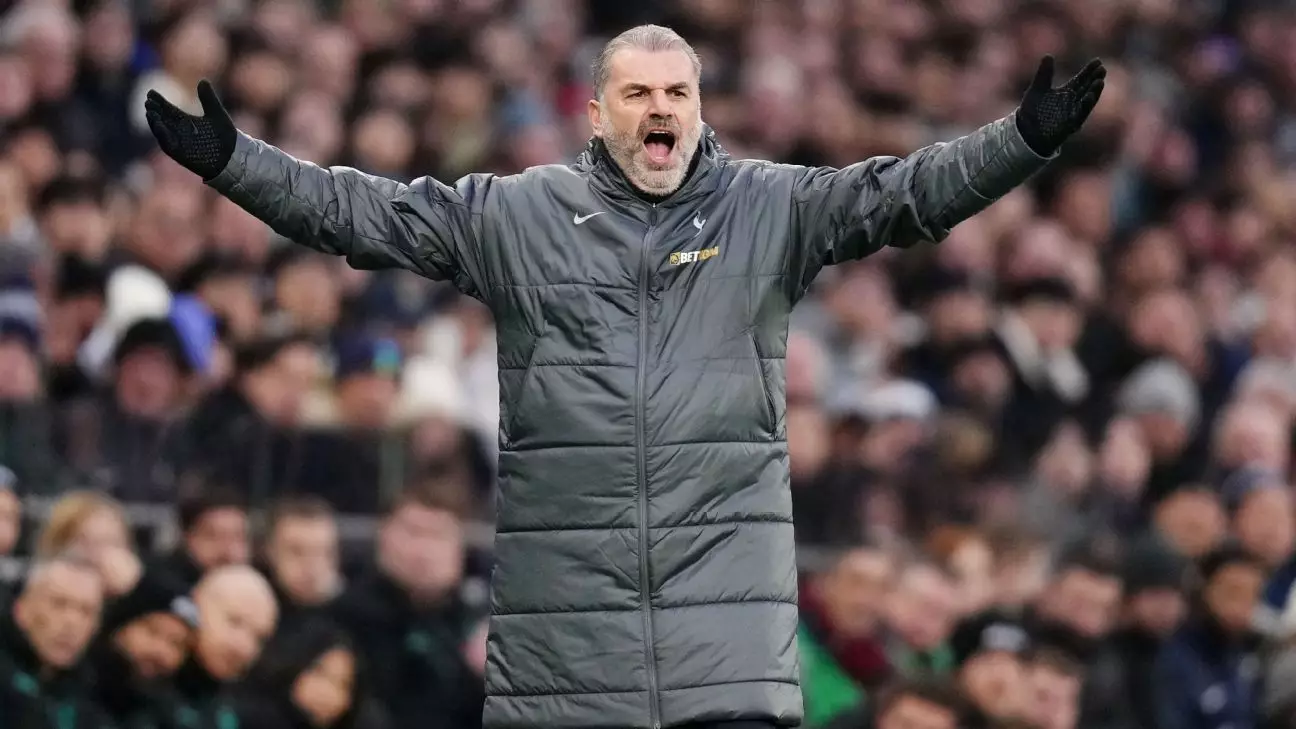The injury crisis plaguing Tottenham Hotspur this season has forced manager Ange Postecoglou to make difficult decisions that reflect a season of dire consequences and missed opportunities. Following a tense 2-2 draw against Wolverhampton Wanderers, Postecoglou candidly discussed the urgent dilemma of player availability, with defender Radu Dragusin being thrust onto the pitch despite grappling with an ankle injury. Given a roster rife with several key players sidelined, the reliance on Dragusin illustrates the depth—or lack thereof—in Tottenham’s squad.
The absence of pivotal defenders such as Cristian Romero, Micky van de Ven, and Ben Davies has left the club vulnerable. Postecoglou’s comment about there being “no choice” but to field Dragusin underscores the precariousness of the situation. With the squad at 11th place—a significant drop from their aspirations—questions arise about the adequacy of depth in critical defensive positions and the ramifications of such an injury crisis on the season ahead.
Postecoglou’s management has often involved utilizing a compact core of players, which, while effective at times, leaves the team susceptible to fatigue and injuries. The latest casualty, Destiny Udogie, despite being pivotal to their tactical vernacular, reflects an overreliance on individuals rather than fostering a resilient squad. Udogie’s early exit due to what appears to be a hamstring injury brought further troubles to a side that had already banked on a limited number of reliable contributors.
Analyzing Postecoglou’s strategy, one must ponder whether a more experimental approach could mitigate the risks faced when core players are unavailable. The coach’s insistence on fielding available core players risks overexposure to injury, as evidenced by the current predicament. Should the strategy shift towards prioritizing squad rotation to ensure fresher legs on the pitch, especially considering the congested fixtures of the Premier League?
Tottenham’s performance stats reveal a team that has struggled to recapture past glories. With only one victory in their last seven Premier League matches, these figures delineate a clear downward trajectory. The early concession of goals—marking their 15th instance of falling behind at home this year—speaks volumes about defensive inadequacies and could signify tactical oversights that have repeatedly seen them on the back foot.
With an impending clash against Newcastle United, the absence of midfielder Rodrigo Bentancur due to a suspension from accruing five yellow cards adds yet another layer of complexity for Postecoglou. Key figures like Richarlison and goalkeeper Guglielmo Vicario are also sidelined, raising alarms about potential repercussions from continued injury crises. The accumulated absences paint a troubling picture of Tottenham’s current operational capabilities, fostering a growing concern about their ability to ascend the league standings.
Beyond physical injuries, one must also consider the psychological effect such challenges have on the team. Players often thrive in a stable environment where trust in their teammates solidifies a collective ambition. With each setback exacerbating their struggle, morale within the squad could take a hit; this situation is often exacerbated in high-stakes leagues like the Premier League.
Postecoglou describes this season as one of judgment calls; it’s imperative that these decisions do not lead to a culture of defeatism. As the team grapples with frustrations stemming from limited rotation options and a string of disappointing results, finding ways to ignite morale and conjure resilience in the face of adversity becomes paramount.
Tottenham’s current state reveals a convoluted road ahead. If they are to avoid sinking further down the league table, strategic adjustments in their player management and health care protocols will be essential. An intensified focus on injury prevention, coupled with tactical flexibility, is imperative for the remainder of the season.
The pressing need for squad depth, adaptability, and morale-boosting solutions is crucial for any semblance of recovery this season. As Postecoglou confronts the consequences of injuries, the question looms: can he rally his troops out of this current plight or will this season mark a worrying chapter in Tottenham’s storied legacy?
